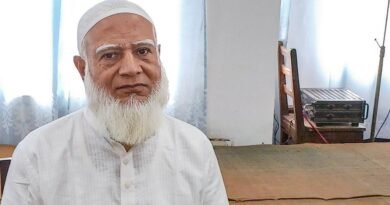How Hashemite Kingdom emerged from Ottoman, British rule to modern-day Jordan
New Delhi: Jordan’s former crown prince Hamzah bin Al Hussein was Sunday accused of an attempted coup against ruling monarch King Abdullah II, resulting in a raid of his palace and the arrest of 16 suspects, including royal aides.
In a video sent to the BBC by his lawyer, Hamzah denied being part of a conspiracy and claimed he was under house arrest. The army subsequently denied this charge.
Hamzah, a half-brother of King Abdullah II, is the oldest son of the late King Hussein and Queen Noor.
Known as Hussein’s favourite, Hamzah was named crown prince after his father’s death in 1999 but was seen as too young and inexperienced to take over the throne. Instead, Abdullah II assumed the throne and in 2004, revoked Hamzah’s title of crown prince to give to his eldest son.
The Hashemite Kingdom has long been considered a stable power in West Asia but the recent events have rocked the country. “For a royal house that usually keeps disagreements private, it was a showdown of unexpected and unusual intensity,” noted a report by The New York Times.
Jordan, a key US ally, has been a major partner in the US-led counter terrorism campaign against the Islamic State and is home to more than half-a-million refugees who have fled the conflict in neighbouring Syria. Along with other Sunni-majority countries like Saudi Arabia and Egypt, Jordan has traditionally aligned against Shia Iran.
Here’s a look at the history of the Hashemite royal family and how modern day Jordan has fared under King Abdullah II.
Who were the Hashemites?
King Abdullah II and Prince Hamzah belong to the Hashemite royal family responsible for establishing the modern state of Jordan in 1921.
Hashemites claim to be direct descendants of Prophet Muhammad through his daughter Fatima and her husband Ali bin Abi Talib.
The Hashemites led the liberation of Arab lands from the Ottomon Empire through the Great Arab Revolt of 1916. Al-Hussein bin Ali, the great-great-grandfather of King Abdullah II, led the revolt and freed the lands of Jordan, Lebanon, Palestine, Iraq, Syria and the Hijaz.
Britain played a key role in the Great Arab Revolt. As depicted in David Lean’s 1962 film Lawrence of Arabia, British archaeologist T.E Lawrence travelled to Jeddah to meet Al-Hussein bin Ali. As a liaison for Britain, he agreed to fight Turkish troops along with the Hashemites. This resulted in the successful attack on the Ottoman fort of Aqaba.
Former US secretary of state Robert McNamara’s book The Hashemites: The Dream of Arabia notes that Britain was initially hesitant “to pursue the Arab nationalist option, while in India, there was serious thought being given to a scheme to settle large numbers of Indians in southern Mesopotamia should Britain conquer that area”.
On 11 April 1921, the Emirate of Transjordan was founded and Al-Hussein bin Ali’s son, Abdullah I, assumed power there.
Jordan’s independence
However, in just over a year, in July 1922, the Emirate of Transjordan came under British rule as confirmed by the League of Nations.
After World War I, the League of Nations put forth a mandate dividing up the former Ottoman Empire among European and regional powers. Britain acquired Mesopotamia (Iraq) and Palestine (modern day Israel, Palestine and Jordan).
Britain granted Jordan independence in 1946 and declared that it would terminate its Mandate in Palestine on 14 May, 1948.
On 25 May 1946, Abdullah I was proclaimed king and the country was no longer named the Emirate of Transjordan but the Hashemite Kingdom of Jordan.
It is important to note around the time of its independence, Jordan participated in the first Arab-Israeli war in 1948, and became a refuge for Palestinians. Today, some estimates say about half of Jordanians are of Palestinian origin. However, the country’s political system and job market usually favour traditional tribes and rural populations over ‘West Bank Palestinians’.
In 1951, Abdullah I was assassinated in Jerusalem and his son Talal ascended to the throne. Talal was later deemed unfit due to mental illness and abdicated in favour of his son, Hussein, who ruled from 1953 until his death in 1999.
King Abdullah II: A modern face of monarchy
Since taking the throne in 1999, 59-year-old King Abdullah II has tried to present Jordan as a moderate and stable nation. According to a report by The Washington Post, he has sought to cast himself as a modern face of the monarchy.
As described by The Atlantic Editor-in-Chief Jeffrey Goldberg, Abdullah is “a semi-absolute monarch”, meaning that while the country has a prime minister and a parliament, Abdullah has the power to dismiss both.
Goldberg added that it is a “miracle” that Jordan emerged intact after the Arab Spring revolutions in 2010s but remarked that the demonstrations were “modest compared with those that led to regime change in Cairo and Tunis”.
Abdullah II faced several protests in 2018 as well over economic issues and calls for more political freedoms.
The royal family’s traditional power base in the public sector has been eroded as Palestinians have helped build the private sector. According to a 2019 paper by Foreign Policy Research Institute, Jordan’s “already struggling economy”, infrastructure and education and health care systems have come under strain by the influx of Syrian refugees. Meanwhile, the refugees face unwelcome sentiments from Jordanians.
It said that there have been “longer droughts, high-intensity rainfall, and water scarcity issues” over the last eight years. This has worsened the environmental situation in a country that is naturally resource-insecure, given that 75 per cent of it is desert land. Also, unlike its West Asian neighbours, Jordan doesn’t have oil reserves to bank on.
“The status quo is unsustainable, and King Abdullah is running out of time to decisively change Jordan’s trajectory,” said the report.
His now-detained half-brother, Hamzah, has also criticised the regime as “stymied in corruption, in nepotism, and in misrule”, which paints a stark contrast to the reformist agenda Abdullah has maintained. (The Print)




